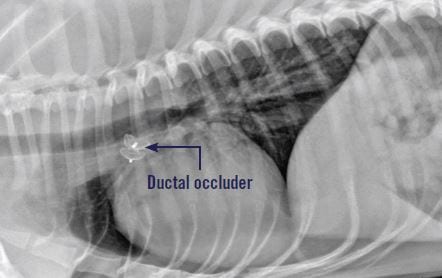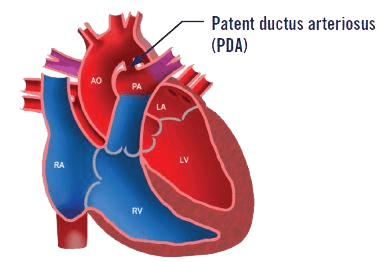PDA in Dogs
What is Patent Ductus Arteriosus (PDA)?
- PDA is the failure of a large blood vessel (ductus arteriosus) to close just after birth.
- In a fetus, this vessel is normal and allows blood to bypass the lungs since the lungs are not used in utero.
- At birth, the vessel should closes within hours, directing blood to flow into the newly inflated lungs.
Who gets this defect?
- PDA is the most frequently seen congenital defect of dogs and is sometimes seen in cats.
- The most commonly affected breeds are Maltese, Poodle, Pomeranian, Keeshond, Bichon Frise, Chihuahua and German Shepherds.
- PDA is more common in females than males in most breeds.
Effects of PDA
- Pets have a greater than 50% mortality rate for patients with a PDA by one year of age if left untreated.
- Heart enlargement that can result in secondary left sided congestive heart failure (fluid in lungs).
How is PDA diagnosed?
- A continuous ‘machinery’ murmur is heard by the veterinarian.
- Referral to a board certified veterinary cardiologist such as those of CVCA for accurate definitive diagnosis via an echocardiogram (ultrasound or sonogram of the heart).
Treatments for PDA in Dogs
- Based on the size of the patient at time of diagnosis and severity of complications, we will recommend one of two procedures:
- Transvenous Catheterization:
- In many patients we use non-invasive occlusion of the PDA.
- A long catheter is placed in a hind leg and passed into the abnormal vessel using fluoroscopic guidance.
- A device called an Amplatzer ductal occluder is then deployed to stop the abnormal blood flow through the PDA.
- Surgical Ligation:
- Smaller dogs and cats require open chest surgery to tie off the vessel itself.
- The procedure requires surgery in the chest cavity but does not require opening the heart itself.
- We collaborate with board certified veterinary surgeons who have experience with this procedure to ensure a high success rate and minimize the incidence of complications.
- Transvenous Catheterization:
Fortunately, with appropriate diagnosis and correction of PDA in dogs, the vast majority of treated pets will live a full and healthy life. Our veterinarians are board-certified for dog cardiology.


device after successful deployment..


